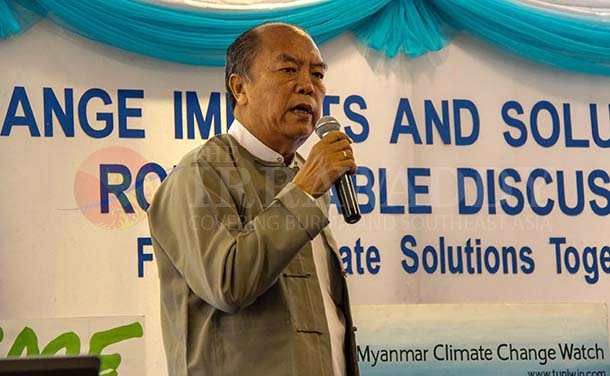RANGOON—As a water shortage hits several townships in Burma’s commercial capital and farmers nationwide anxiously await the upcoming rainy season, environmentalists are calling for more government support in the fight against climate change in this country of 60 million people.
While Burma’s nominally civilian government has earned international praise for its program of political and economic reforms after decades of military rule, environmentalists say climate change is a pressing issue that has been pushed to the back burner for too long by the nation’s leaders.
“The new government is trying to solve poverty and civil war, but unfortunately climate change has never been well acknowledged by our decision-makers,” meteorologist Dr. Tun Lwin said on Saturday in Rangoon at roundtable discussion about global warming in Burma, as temperatures in the country’s biggest city soared to 38 degrees Celsius.
Tun Lwin, the founder of Myanmar Climate Change Watch, a private nonprofit that monitors climate change in the country and shares weather information with the public, said global warming had contributed to the water scarcity in Rangoon and droughts farther north.
“If it [climate change] continues, it will continue to have consequences in the coming years,” he said. “That’s why we’re asking for more government support, because we can’t handle this issue alone.”
The country’s monsoon season has also been affected by global warming. Since the late 1970s, Tun Lwin said, Burma has lost about 40 days from the historic average duration of its rainy season, usually about 145 days from May to September.
“The rains come late and leave early,” he said, adding that deforestation and excessive logging had also disrupted monsoon patterns.
Burma was rated the second-worst country, only behind Bangladesh, among seven Asian countries in a “Global Climate Risk Index” by the climate change watchdog Germanwatch.
The Berlin-based group ranked Burma as the world’s worst affected country in 2008 after Cyclone Nargis devastated the Irrawaddy Delta, killing and displacing tens of thousands of people.
Last year, the Asian Development Bank warned in its “Myanmar in Transition” report that climate change was second among a list of four major risks the country faced during its transition from military rule, adding that many elements of the government’s political and economic agenda would be out of step if not accompanied by environmental reform.
“It can no longer be ignored and it’s important to come together to encourage decision-makers to really invest in a solution,” said Von Hernandez of Greenpeace, one of the world’s most vocal environmental groups, which also co-hosted the roundtable discussion at Rangoon’s Park Royal Hotel.
Hernandez, executive director of Greenpeace’s Southeast Asia division, called for climate-conscious investment as Burma opens up to foreign companies.
“With investors coming in, Burma is now at a significant crossroads,” he said during the discussion. “You have to be careful about what kind of investment you have. You need to have clean investment that protects your environment.”
Burma signed the UN Framework Convention on Climate Change (UNFCCC) in 1992 and ratified the international environmental treaty two years later. It also ratified the Kyoto Protocol in 2003.
The country had no official department solely for environmental issues until eight months ago, when the government formed the Environment Conservation Department and Parliament passed the Environmental Conservation Law. But rules and regulations to enforce the law are still in the pipeline, waiting for approval from government, so the new department has little power to act.
“We are just a very new department, but I hope we can do more when the rules and regulations for the environment law are approved,” said Than Aye, the department’s deputy director. “At that time, we can enforce relevant rules to protect our environment more effectively.”
The government is also working with environmentalists from Spectrum, a sustainable development network in the country that helped organize the discussion in Rangoon.
Ko Ko Lwin, the network’s program officer, said government officials understood the consequences of climate change and were working to better address the problem.
“There might be some delays in their actions on the issue. On the other hand, they also have other things to focus on,” he said. “Instead of pushing them too hard for what you want, you should cooperate with them. As our country undergoes this reform process, we need to be patient to get things right.”
Meanwhile, farmers across the country are praying for rain as their crops wither away under the scorching hot sun.
“I received a phone call from a farmer upcountry a few days ago, asking me when the rains would come for his paddies, which are dying due to drought,” Tun Lwin said.
The former delegate to the UNFCCC Subsidiary Body for Scientific and Technological Advice said climate change could hinder the government’s poverty alleviation program, as 70 percent of Burma’s population works on farms and agriculture is the country’s biggest economic sector.
“As long as they [the government] ignores climate change, make no mistake, there will be no success in their poverty alleviation,” he said.

















